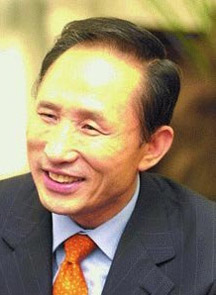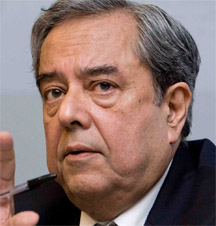By Johann Earle in South Korea
In the backdrop of rich Korean tradition and culture on display in Jeju Island, South Korea, the World Conservation Congress 2012 officially opened yesterday with a warning that a new ethic was needed for more sustainable development.
The IUCN World Conservation Congress, the world’s largest and most important conservation event, takes place every four years.
Among the special guests at the Congress were President of Korea, Lee Myung-bak; former President of Guyana, Bharrat Jagdeo; Minister of the Environment for the Republic of Congo, Henri Djombo and former Minister of the Environment and International Development of Norway, Erik Solheim.

Delegates will also be joined by notable figures including human rights advocate Bianca Jagger, leading author and oceanographer Sylvia Earle, Japanese singer/songwriter Iruka and Prince Carl Philip of Sweden amongst other CEOs, and several government ministers and heads of major NGOs and UN agencies, the Congress organisers said.
Speaking at the opening ceremony at the Jeju International Conference Centre, President of the Republic of Korea Myung-bak noted that “our daily meals come from nature and most of our medicines come from nature.” He said that nature has been compromised because of reckless development on the part of humans. The President outlined some of what Korea was doing to protect nature and said that there are plans to make the demilitarized zone between South and North Korea a conservation exemplar.
Further, he said that South Korea will fulfill a commitment made at the Rio + summit earlier this year in Brazil to contribute US$5 billion to the Global Fund by 2020 and will also contribute to the Global Green Growth Institute.
He paid tribute to the IUCN for playing a critical role on the side of nature for the past 64 years.
Speaking at the opening ceremony, President of the IUCN Ashok Khosla said that the Congress is a wonderful opportunity to meet in a country which has demonstrated what could be achieved in terms of conservation. He described Jeju as a place of natural beauty which is rich in cultural traditions.
Khosla said that the IUCN is an institution which not only has a brain but legs, arms and a heart. He said that the body has the ear of governments around the world. “Its advice is respected by world leaders and conservation practitioners alike, because it is based on field evidence, operational experience, rigorous analysis and a highly active conscience. IUCN understands that for nature to be properly cared for, conservation action must be designed at the global and national level and implemented at the regional and local levels within the larger context of sustainable development,” Khosla said.

“For conservation to be successful, we must address not just the imperatives of the natural environment, but also of the economic, social and political environments. Conservation policies and action cannot succeed for long unless nations and communities use their resources efficiently, distribute the benefits equitably and empower their citizens actively and inclusively. This requires high levels of responsibility in governance – with firm commitment to social justice through transparent processes and the participation of all those in making decisions that affect them,” he said.
Harmony
He added that the output of IUCN’s Commissions have been highly successful in showing the way to a future that is supported by much greater harmony between humankind and nature.
“Mr President, I believe that the nature of ethics we need to evolve must now emerge from the ethics of nature, derived from the imperatives of ecological survival and universal human well-being. The new ethic needed for a more sustainable development can only come about when we look further down the road at the impacts of our policies and actions,” he said.
Khosla added that this meant the IUCN must now lengthen its time horizons, widen its spheres of concern, and greatly expand its attention “to the lives and livelihoods of those far away or those not yet born.”
“And above all we have to regain humanity’s basic reverence for life; both at the individual and societal level,” he said.
According to the Congress organisers, more than 8,000 people from more than 170 countries are in Jeju “to discuss, debate and vote on solutions to some of the globe’s most pressing environmental and development issues.”
The Congress, which runs to 15 September, has brought together government and non-governmental organizations, scientists, business and community leaders from around the world to look at how nature provides the solution to many of the world’s problems.
“Nature is inherently strong, but we must improve how quickly nature and people adapt to change,” the IUCN quoted Julia Marton-Lefèvre, its Director-General as saying. “If we strengthen nature, we’ll see that ecosystems are more resilient and people, communities and economies are healthier.”
The Congress agenda includes the latest news from the IUCN Red List of Threatened Species, growing threats to tuna populations, fresh figures on coral reef destruction and the urgent need to stop countries making false claims on ocean protection.
“Several important multimillion dollar announcements on initiatives and corporate partnerships with major international business will also be made. Climate change, growing threats to natural ecosystems and improving global decision -making on environmental issues will also feature,” the Congress organisers said.




